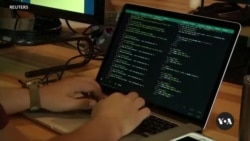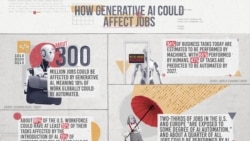ໃນຂະນະທີ່ເຕັກໂນໂລຈີ ສ້າງເນື້ອໃນຂຶ້ນມາ ໂດຍປັນຍາປະດິດ ຫຼື AI ເຊັ່ນ ChatGPT ໄດ້ຮັບຄວາມນິຍົມນັບມື້ນັບຫຼາຍຂຶ້ນ, ພວກມັນກໍາລັງເລີ່ມປ່ຽນແປງອະນາຄົດຂອງຕະຫຼາດແຮງງານ. ບາງຄົນຢ້ານວ່າ ຈະມີການຫວ່າງງານຢ່າງຫຼວງຫຼາຍ, ແຕ່ບາງຄົນກໍເບິ່ງເຫັນອະນາຄົດທີ່ສົດໃສສຳລັບການຮ່ວມມື ລະຫວ່າງມະນຸດ ແລະ AI.
ລະບົບອັດຕະໂນມັດ ໄດ້ສົ່ງຜົນກະທົບຕໍ່ພວກຜູ້ອອກແຮງງານໃນທົ່ວໂລກ ມາເປັນເວລາຫຼາຍກວ່ານຶ່ງສະຕະວັດ ... ທັງໄດ້ທໍາລາຍ ແລະໄດ້ສ້າງວຽກເຮັດງານທໍາ.
ໃນປັດຈຸບັນນີ້, ບັນດານັກຊ່ຽວຊານກໍາລັງເບິ່ງໄປຂ້າງຫນ້າ ເພື່ອພະຍາຍາມຄາດຄະເນວ່າ ປັນຍາປະດິດທີ່ສ້າງເນື້ອໃນ ຫຼື GenAI ຈະປ່ຽນແປງວິທີການເຮັດວຽກຂອງພວກເຮົາໄດ້ແນວໃດ.
ທ່ານ ຊານເຈ ເພັທໄນກ໌ (Sanjay Patnaik) ຈາກສະຖາບັນ Brookings ກ່າວວ່າ ເນື້ອໃນທີ່ສ້າງຂຶ້ນໂດຍ AI ເຊິ່ງກຳລັງກ້າວເຂົ້າມາໃນຂະແໜງຕ່າງໆ ທີ່ຄັ້ງນຶ່ງເຄີຍເພິ່ງພາມະນຸດເທົ່ານັ້ນ.
ທ່ານ ຊານເຈ ເພັທໄນກ໌ (Sanjay Patnaik) ຈາກສະຖາບັນ Brookings ກ່າວຜ່ານ Zoom ວ່າ:
“ວຽກງານທີ່ມີຄວາມສ່ຽງສູງທີ່ສຸດໃນຊ່ວງການເລີ້ມຕົ້ນນັ້ນ ແທ້ຈິງແລ້ວ ແມ່ນການເຂົ້າເຮັດໃໝ່ໆ. ນັກວິເຄາະດ້ານການຕະຫຼາດ, ຜູ້ຊ່ວຍການວິິໄຈ, ນັກວິເຄາະທາງດ້ານການເງິນ, ສິ່ງທີ່ສາມາດເຮັດໃຫ້ເປັນແບບອັດຕະໂນມັດ ຂ້ອນຂ້າງໄດ້ງ່າຍ, ເຊິ່ງເປັນວິທີຊ້ໍາຊ້ອນຫຼາຍ.
ແຕ່ນັກຊ່ຽວຊານບາງຄົນກ່າວວ່າ ຍັງຂາດບຸກຄະລາກອນທີ່ມີຄຸນສົມບັດທີ່ເໝາະສົມ ອີກດ້ວຍ. ທ່ານນາງ ຊູຊານ ບີລເລີ (Susanne Bieller) ຈາກສະຫະພັນຫຸ່ນຍົນສາກົນກ່າວວ່າ AI ກຳລັງເຂົ້າມາມີບົດບາດຫຼາຍຂຶ້ນ.
ນາງ ຊູຊານ ບີລເລີ (Susanne Bieller) ກ່າວຜ່ານທາງ Zoom ວ່າ:
"ພວກເຮົາກໍາລັງເບິ່ງວຽກງານທັງຫຼາຍ ທີ່ຫາຍໄປ ເພາະວ່າ ບໍ່ມີໃຜຝຶກອົບຮົມສໍາລັບວຽກງານເຫຼົ່ານັ້ນອີກຕໍ່ໄປ. ຕົວຢ່າງທີ່ດີສໍາລັບສິ່ງນັ້ນ ກໍແມ່ນວຽກງານຊ່າງຈອດ. // ດັ່ງນັ້ນ, ພວກເຮົາໃຊ້ວິທີແກ້ໄຂດ້ວຍຫຸ່ນຍົນ ເພື່ອເອົາຊະນະບັນຫານັ້ນ ແລະຍັງເຮັດວຽກງານການຈອດໂລຫະທັງຫມົດທີ່ຈຳເປັນ.”
ແລະ ທ່ານນາງ ອາບີແກລ ກີລເບີທ (Abigail Gilbert) ຈາກສະຖາບັນເພື່ອອະນາຄົດຂອງການເຮັດວຽກ ເວົ້າວ່າ ມີບາງສິ່ງບາງຢ່າງທີ່ປັນຍາປະດິດບໍ່ສາມາດເຮັດໄດ້.
ທ່ານນາງ ອາບີແກລ ກີລເບີທ (Abigail Gilbert) ຈາກສະຖາບັນເພື່ອອະນາຄົດຂອງການເຮັດວຽກ ກ່າວຜ່ານ ທາງ Zoom:
“... ຍັງມີຄວາມຕ້ອງການທີ່ໜັກແໜ້ນ ແລະຄວາມຕ້ອງການຢ່າງຕໍ່ເນື່ອງສໍາລັບການສື່ສານ, ການຄິດແບບໃຊ້ການພິຈາລະນາໄຕ່ຕອງ ແລະຄວາມເປັນຜູ້ນໍາພາຍໃນທຸລະກິດ. ສະນັ້ນ, ບັນດາທັກສະເລົ່ານັ້ນ ທີ່ໄດ້ຮັບການຮັບປະກັນຈາກວິຊາສິລະປະ ແລະ ມະນຸດສາດ ຍັງຄົງມີຄວາມສຳຄັນຕໍ່ຕະຫຼາດແຮງງານ.”
ແລະ ທ່ານ ຊອນ ເດລີ (Shawn Daly) ຈາກມະຫາວິທະຍາໄລ ໄນອາກາຣາ (Niagara) ກ່າວວ່າ AI ຈະບໍ່ສູນຫາຍໄປ ແລະວິທີນຶ່ງທີ່ຈະຍັງຖືກວ່າຈ້າງຢູ່ຕໍ່ໄປໄດ້ ແມ່ນການມາເປັນນັກຊ່ຽວຊານໃນດ້ານ AI ...
ທ່ານ ເດລີ (Shawn Daly) ກ່າວຜ່ານ Zoom ວ່າ:
"ຜູ້ທີ່ເຂົ້າໃຈເຄື່ອງຈັກ ຈະເຮັດໃຫ້ຄວາມສາມາດທະວີຂຶ້ນຢ່າງຫຼວງຫຼາຍ. // ບາງສ່ວນ ກໍຈະເປັນຜູ້ສ້າງເນື້ອໃນ ທີ່ສາມາດສ້າງຜົນງານທີ່ມີເອກະລັກສະເພາະ ແລະຮູບແບບທີ່ເປັນເອກະລັກຈາກເຄື່ອງສ້າງຂໍ້ຄວາມ, ເຄື່ອງສ້າງຮູບພາບ, ເຄື່ອງສ້າງວິດີໂອ, ແລະຕົວສ້າງໂປຼແກຼມ."
ໃນການທີ່ຈະໄປຮອດຈຸດນັ້ນ, ທຳນຽບຂາວ ຈຶ່ງປະກາດແຜນການເພີ່ມຈຳນວນນັກຊ່ຽວຊານດ້ານ AI ໃນການໃຫ້ບໍລິການຂອງລັດຖະບານກາງ ຕື່ມອີກ 500 ຄົນພາຍໃນປີໜ້ານີ້.
ອ່ານລາຍງານນີ້ເປັນພາສາອັງກິດລຸ່ມນີ້:
As generative AI technologies like ChatGPT rapidly gain popularity, they are beginning to change the future of the job market. Some fear mass unemployment, but others see a bright future for human-AI cooperation. Maxim Adams has the story.
Automation has been impacting the world's workers for well over a century ... destroying and creating jobs.
Experts are now looking ahead to try to predict how generative artificial intelligence or GenAI will change the way we work.
Sanjay Patnaik with the Brookings Institution says generative AI is moving into areas that once depended exclusively on humans.
Sanjay Patnaik, The Brookings Institution through Zoom:
“The jobs that are at highest risk in the beginning are really entry-level jobs. Marketing research analysts, research assistants, financial analysts, things that can be automated relatively easy, that are very repetitive."
But some experts say there’s also a lack of qualified personnel. Susanne Bieller from the International Federation of Robotics says AI is just picking up the slack.
Susanne Bieller, International Federation of Robotics through Zoom:
"We're looking at jobs that vanish because no one is training for those jobs anymore. A good example for that is the welder. // So, we use the robotic solutions to overcome that issue and still perform all the welding jobs needed.”
And Abigail Gilbert with the Institute for the Future of Work says there are some things artificial intelligence just can’t do.
Abigail Gilbert, Institute for the Future of Work, through Zoom:
“... there is still a strong demand and a persistent demand for communication, critical thinking and leadership within businesses. So, those kinds of talents that are secured from arts and humanities subjects remain critically important to the labor market.”
And Shawn Daly with Niagara University says AI isn’t going away and one way to stay employed is to become an expert in AI...
Shawn Daly, Niagara University, through Zoom:
"People who understand the machine will have their abilities so tremendously magnified. // Some of them are going to be content creators who can create unique pieces and unique forms from the text generators, the image generators, the video generators, and the program generators."
To that end, the White House announced its plans to increase the number of AI specialists in federal service by 500 people by next year.







ຟໍຣັມສະແດງຄວາມຄິດເຫັນ